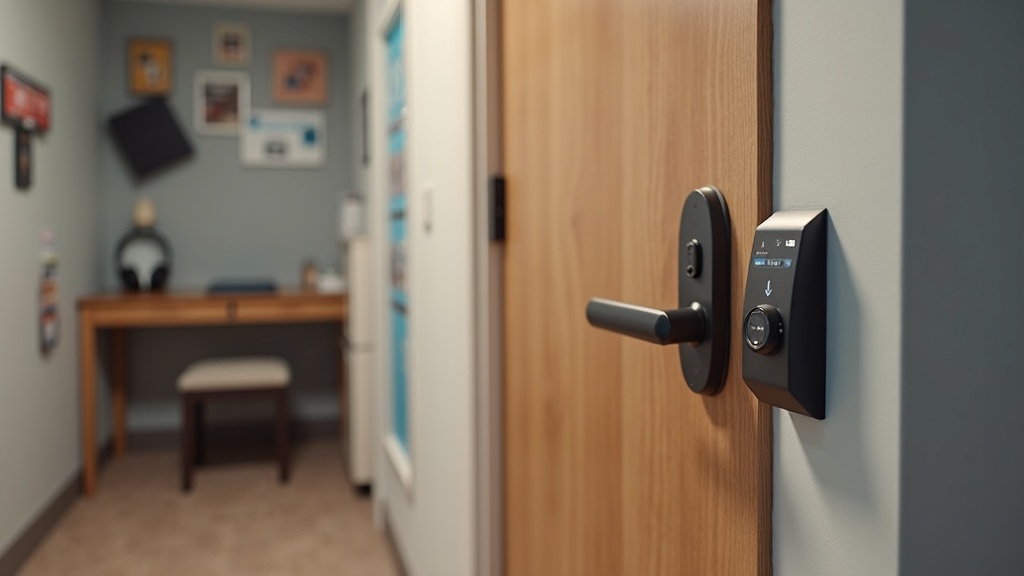Smart locks have made it way easier for college students to protect their stuff in dorm rooms. If you’re sharing a building with dozens (or even hundreds) of others, security isn’t something to shrug off. I’ve picked up a bunch of practical tips, and I’m sharing them here so you can keep your gear and personal space safe, even if your campus is super busy.

Why Smart Locks Fit Dorm Living
Most dorms come with basic locks. Sometimes it’s just a single deadbolt or a keyed entry. Smart locks, though, add a lot more control. With features like app access, temporary guest codes, and activity logs, you actually keep track of who comes and goes. This is pretty handy if you have roommates or friends who need to drop by, but you don’t want to hand out copies of your key.
Switching to a smart lock gives you convenience, but you still need to be savvy with your setup. The goal isn’t just to have the fanciest gadget—it’s to set up something that keeps your room locked when you need it and lets you keep tabs on your space. Here’s a rundown of what to prioritize and how to use these locks to their full potential.
Getting Started With Smart Lock Security
Swapping the standard lock for a smart one isn’t tricky, but you’ll want to check with campus housing staff before you do anything. Some colleges have rules about swapping out hardware or drilling into doors. Most popular smart locks (like August, Yale, or Level Lock) don’t require much hardware work at all and are easy to install and remove, so that’s worth checking out if you’re nervous about getting in trouble with your RA.
Pick a smart lock that works with your phone (Android or iOS) and doesn’t require a ton of extras like a WiFi bridge or subscription. Once installed, sync it with your device and set up a main passcode only you (and maybe trusted roommates) have access to. Take five minutes to disable guest or secondary codes when you aren’t actively using them, so one-off visitors don’t accidentally have access later.
- Check compatibility: Some smart locks fit better over deadbolts. Make sure to match the lock type to your dorm door.
- Pick app based access: Most new dorm-friendly smart locks let you open the door with your phone or watch instead of a physical key.
- Use activity logs: Locks that show a digital history of when the door is opened (and by who) can help you spot any funny business fast.
How To Lock Up Valuables In a Dorm Room
Even if your main entry is secure, break-ins and thefts can happen if someone sneaks inside while the door is open or if you leave the room unlocked. Lockboxes, desk safes, and cable locks are super useful for stuff like laptops, passports, and backup drives. Just make sure the container itself can be tethered to a heavy or fixed object, so it can’t just be grabbed and carried out. You may also want to keep an itemized list, so if anything does go missing, you have a quick reference.
- Portable Lock Box: These fit in a desk drawer or under your bed. Go for one with a steel cable you can loop around your bed frame or closet rod.
- Mini Safe: Perfect for small valuables or cash. Look for reliable biometric or keypad models.
- Laptop Security Cables: These cables connect your laptop to something immovable, like a desk or bunk rail.
- Keep Inventory: Snap quick photos of your valuable items and serial numbers. If anything goes missing, this makes insurance claims and police reports easier.
Smart locks on the main door pair really nicely with small safes or strongboxes. Even if someone gets in, your valuables remain a lot harder to swipe.
Can I Put a Security Camera In My Dorm Room?
Adding a camera can be useful, but it’s super important to check campus privacy rules and let your roommates know. Most colleges strictly ban any camera facing common hallways or bathrooms to protect everyone’s privacy.
Inside your room, a simple WiFi camera can record motion or alert you when someone enters. Make sure all roommates are cool with it before you set it up. Never hide a camera or record audio without agreement. Doing so can break privacy rules and even the law depending on where you are.
- Use clear signage: Put up a notice if you use a camera, so no one is caught off guard.
- Disable recording when you or roommates are present: Only record when everyone is away, using a schedule or geofencing setting.
- Keep feeds private: Secure your camera with a strong password and never share footage except with proper authorities.
If everyone in the room gives the green light, a basic indoor cam adds an extra level of peace of mind for tracking visitors or maintenance workers who might pop in during breaks or emergencies. Putting up a little sign on your door can also be a good courtesy to let others know they’re being recorded if they enter.
Should You Lock Your Dorm Room?
It’s really important to lock your dorm room anytime you leave—even for a minute. Most thefts in college happen because a door was propped open or left unlocked while residents were showering, studying, or just grabbing laundry. A smart lock makes it simple to relock the door fast, even remotely if you forget.
Some locks automatically relock after a minute (autolock), which helps you never forget. Backup key access is good if your phone dies, just don’t hide keys near your door. Smart locks make it quick to check: just open your app and see if the door’s secure. Try creating a routine, like tapping your pocket for your phone and checking the app before you walk out, so locking becomes second nature.
How To Make a Dorm Room More Private
Dorm rooms rarely offer much in the way of privacy, but you can up your game a bit. Blackout curtains or tension rod dividers give you more control over your space, especially in shared rooms. Some students hang privacy screens from the ceiling or even use locker room-style changing tents if space is tight. “Do Not Disturb” signs and clear boundaries help too; sometimes you just need to set the expectation about knocking before entering. Adding little personal touches like a white noise machine or noise-cancelling headphones can also help you focus and keep your conversations a bit more private.
- Use smart lock guest codes only when needed: Set temporary access if friends need to water plants or drop off notes, then disable codes when done.
- Add privacy screens: Freestanding or collapsible screens are cheap and effective for splitting up shared rooms.
- Install blackout curtains or window film: This stops people outside from peeking in (especially during the evening).
- Position desks and beds creatively: Even small rearrangements can help carve out your own zone.
Common Smart Lock Security Questions For New College Students
Moving into college can feel overwhelming, so here are the questions I hear most (with short, practical answers):
Question: How do I install a smart lock in my dorm without breaking housing rules?
Answer: Most “retrofit” locks slip over existing deadbolts and need only a screwdriver. Check with campus staff before installing, and save all original pieces so you can switch back when you move out. Make sure you aren’t damaging the door or frame, as that could cause extra fees when you move out.
Question: Are smart locks more secure than standard keys?
Answer: In lots of cases, yes. You control who has access and don’t have to worry about lost keys. Most models use encryption and strong, tamper-resistant hardware. Just avoid sharing codes and update passwords when needed. Still, always keep an eye out for odd activity in your activity logs.
Question: What happens if the WiFi or power goes out?
Answer: Most smart locks work with Bluetooth and battery backup, so you can still lock and unlock with your phone nearby. Always keep an extra battery or the original key on hand just in case. Regularly check battery levels in the app; most give you a warning before running out.
Question: Can my lock get hacked?
Answer: Any device connecting to the Internet comes with risks, but sticking to name brand locks (August, Yale, Schlage, Level) with regular firmware updates helps keep things safe. Enable two-factor authentication and never use default passwords. If you ever feel like your codes might be compromised, change them right away.
Extra Tips For College Dorm Security
- Always change key codes or e-keys after a roommate moves out or if your codes get shared during a party.
- Don’t share your lock apps or login details, even with friends.
- Pair smart locks with a doorstop alarm for extra security when you’re inside. It’ll give a super loud alert if anyone tries to force entry.
- Check for campus-run property registration. Many colleges tag valuables for free, which can help recover your stuff if it gets stolen.
- Use strong, random access codes (not birthdays or easy-to-guess names).
- Consider chatting with your RA or building security about any concerns. They’re usually happy to help students set up safe dorm living and can provide resources or advice.
Smart locks are only one part of a good dorm room security plan. Back them up with physical habits—lock up every time you leave, don’t share keys or passwords, and get to know your neighbors. Building trust and a security routine early on will save you a ton of stress over the school year. And remember, campus safety is often a community thing: watching out for each other helps make dorm life safer for everyone.
